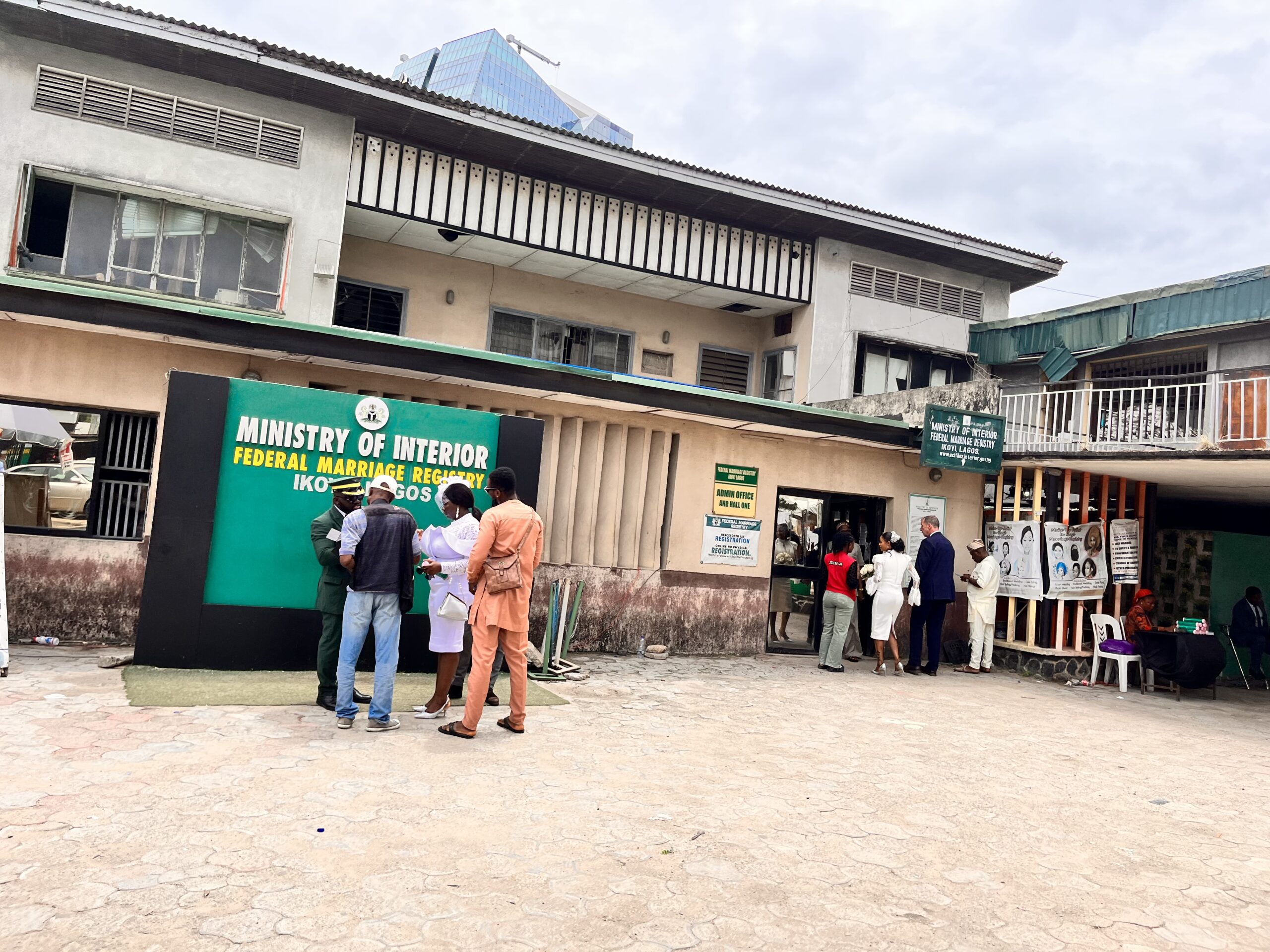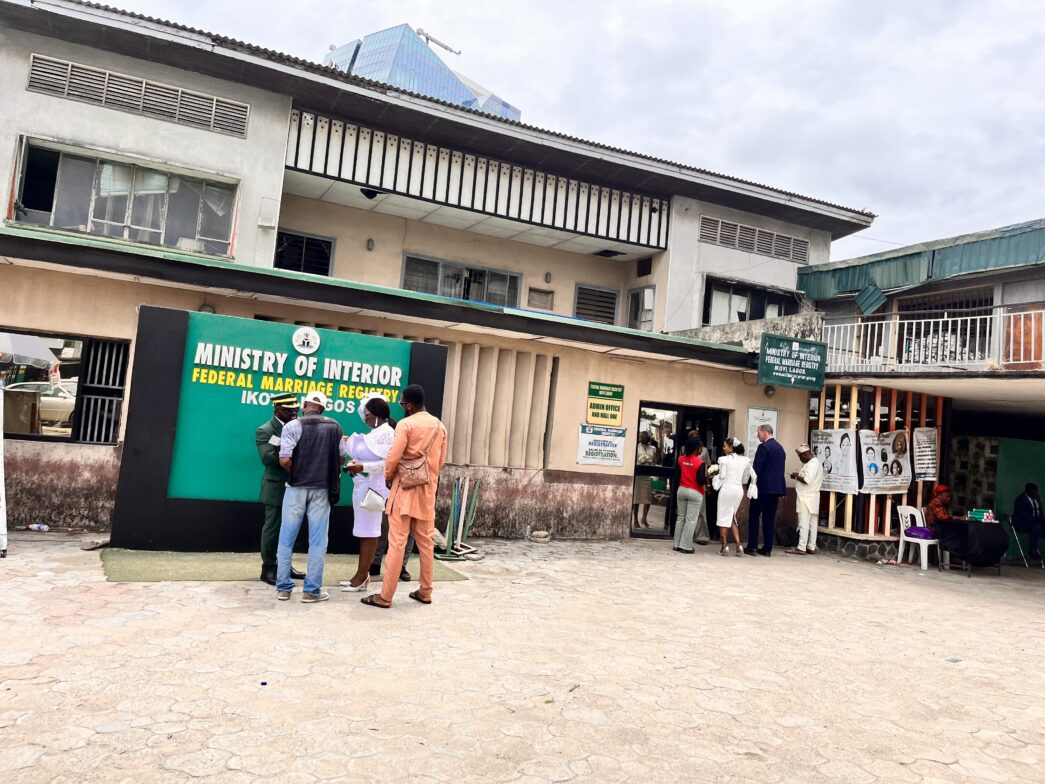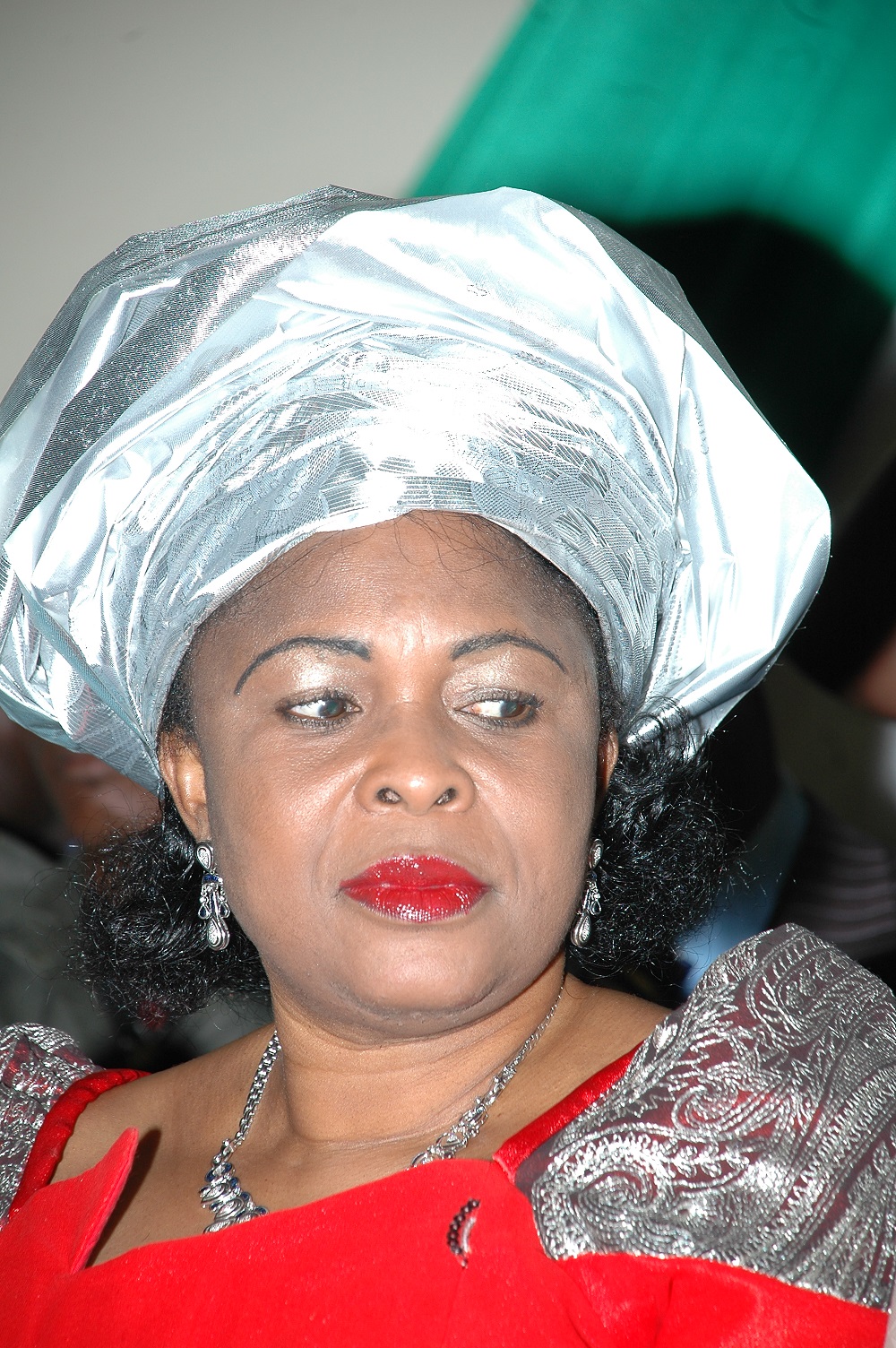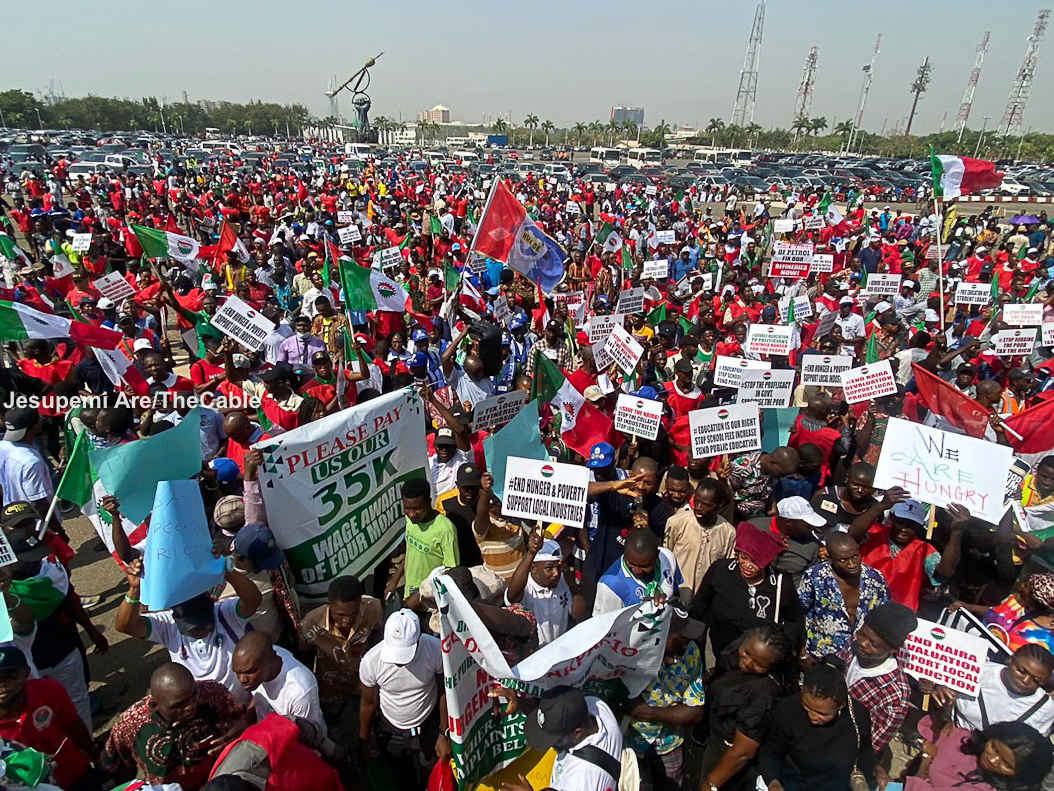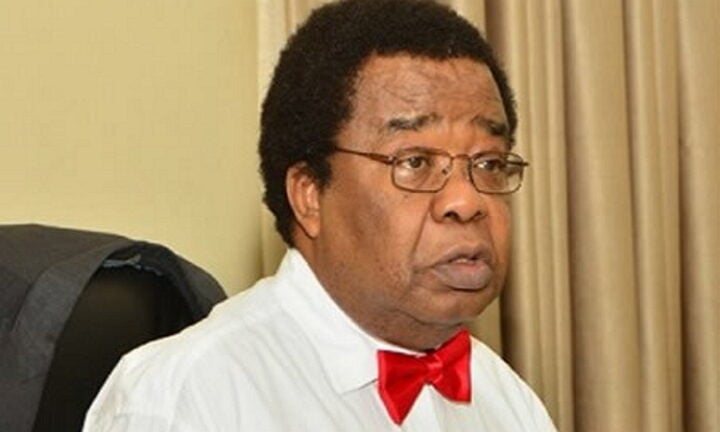The Federal Marriage Registry, Ikoyi, Lagos is unarguable Nigeria's most patronised registry
Nothing seems to have changed. Old habits die hard. In 2021, an investigation into extortion and systemic corruption at the Federal Marriage Registry, Ikoyi, Lagos, caused a frenzy online and elicited reactions from citizens, with many sharing unpleasant experiences at the public facility which is the country’s first marriage registry.
Affected persons detailed the frustration, harassment and stress they encountered before they could get married and obtain their certificates. As a result of the uproar, the ministry of interior asked the registry to stop the physical registration of marriages and revert to the online portal created for that purpose. Most importantly, the registrar was redeployed to another state and an indicted staff member was sacked.
This was the relief the citizens needed to register for marriage licences from the comfort of their homes without being forced to pay above the official fee and other bribes. The intervention also eliminated the stress associated with the process.
But the changes made by the ministry turned out to be short-lived.
Advertisement
A few months later, the registry returned to its old ways. It opened one of its offices at the Ikoyi facility for physical registration; staff members charged above the official rate and demanded bribes from intending couples. Some applicants who started their registration processes from the online portal were made to restart the process at the office for the application to be processed.
A CESSPOOL OF CORRUPTION
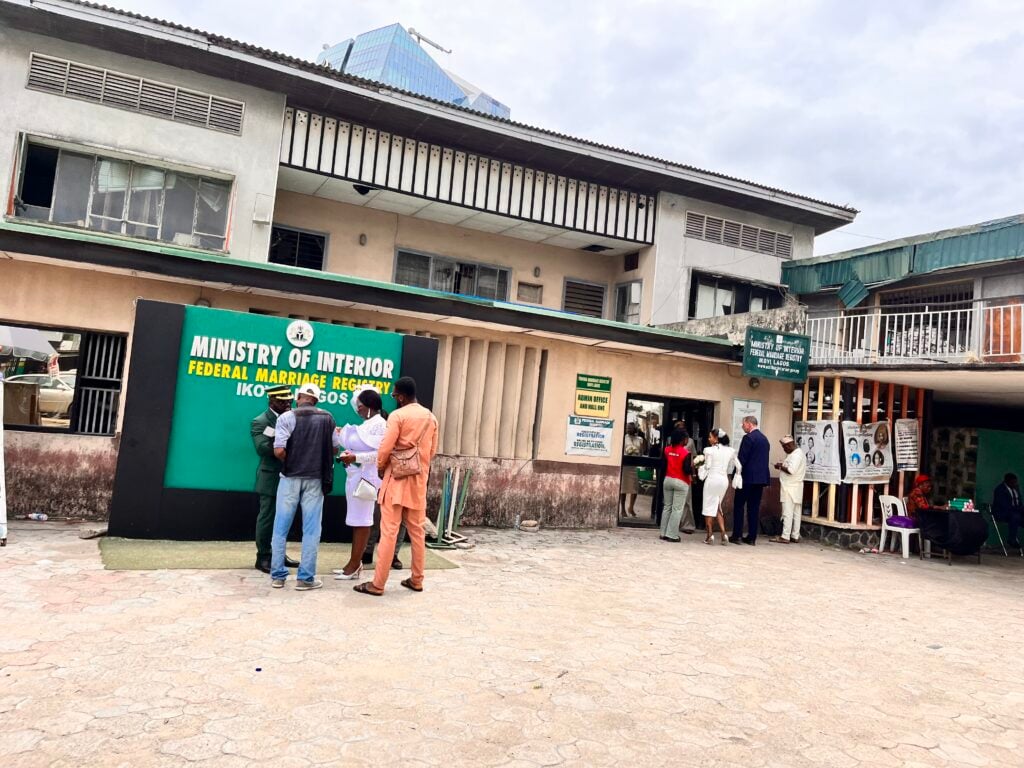
When David Akinrinade got married at the Ikoyi registry on June 9, 2022, some months after the ministry implemented the change of policy, he was initially excited until the process became too long and frustrating.
Advertisement
Every official he interacted with demanded a token before he could proceed to the next stage. He assumed the actual marriage ceremony would be the easiest stage after he visited the premises a few months earlier to fill out the application forms and pay the fees, which he said were slightly above the official fee published on the ministry’s website.
“I paid N28,000. I transferred the money to the account of one of the officials at the registration point, but I was not given a receipt,” David told TheCable.
“During the wedding ceremony, I registered upon arrival and paid N1,000 for our name to be written down. We were asked to wait with other couples under the canopy; the waiting period was for about one hour after which we were called into the hall. There was a mini orientation for the couples and we paid another N400. The hall was crowded.
“We didn’t have to give them drinks, or food, but the oath-taking official requested money from me, my wife and our best man/lady. The waiting time in the morning was much and we had to pay to collect the certificate, can’t remember how much.”
Advertisement
In a Twitter post on April 18, Lucy Ndukwe, a nurse who had her wedding at the Ikoyi registry earlier in the year, lamented the extortion at the facility and how couples were forced to part with money before they could get their certificates.
“So, I had my civil wedding recently in Ikoyi marriage registry, Lagos, Nigeria, and the lady issuing the certificate INSISTS everyone (Couple and 2 witnesses) tips her with 2k each,( a total of 8k) b4 she issues us our certificate & she did this for all couple. Which way Nigeria?” she wrote.
“It’s okay to ask for appreciation, but insisting on an amount to be given is daylight robbery and tasking everyone including the witnesses? There were over 200 couples to be wedded the same day. Now imagine how much the rip-off, even while earning salaries. This is ridiculously horrendous!
“Even if you didn’t have cash, she would give you her account number for the transaction, forgetting she could be fished out with the name on the account. Timid corruption!”
Advertisement
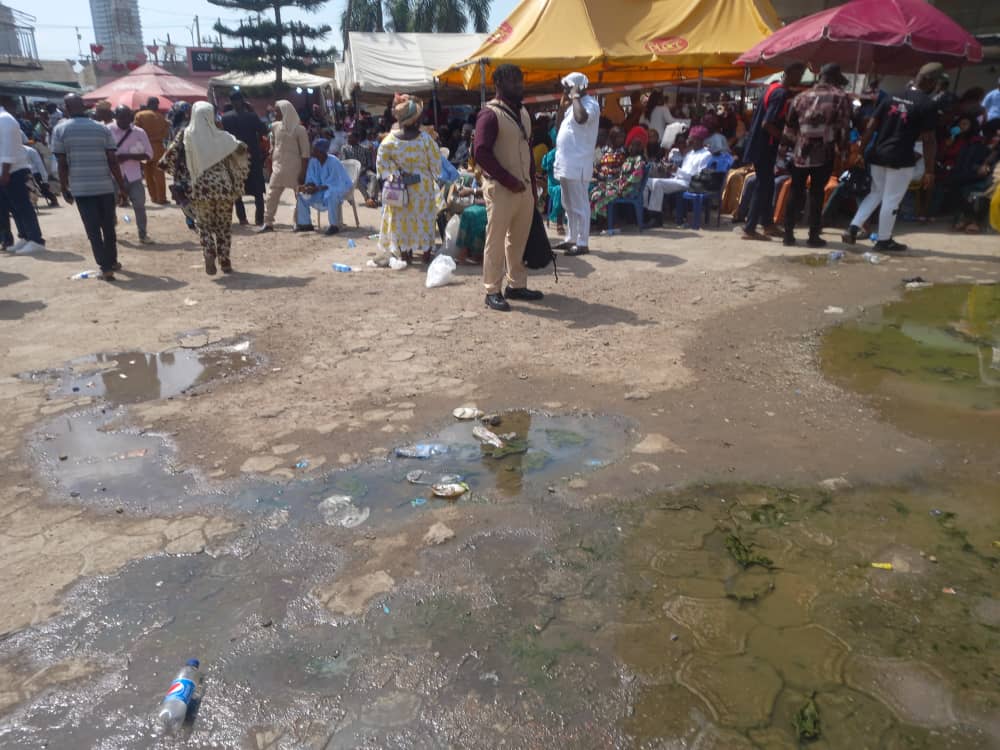
When Malachy Odo, a lawyer, got married in March 2021, he was told to bypass the online portal. He was eventually extorted.
In July 2023, two years after that experience, it was the same story when Odo returned to the registry to witness his friend’s wedding to a Russian lady.
Advertisement
“I was at Ikoyi Marriage Registry a few days ago and the way these guys shake down couples and their loved ones to the last penny is unprecedented. The aggressive begging and official corruption going on there needs to be looked into,” Odo said.
“We were given numbers and when it got to our turn, we went into the hall for the ceremony – just myself, the couple and a sister of my friend. After they exchanged vows and took pictures, the officials (two ladies) asked us to ‘drop something on the table’. My friend told them he had already spent so much that day and didn’t have cash but they insisted that he had to pay something before they would release the marriage certificate.
Advertisement
“I told them that what they were doing was wrong and that we had no money to give them but they didn’t seem bothered. The Russian lady was perplexed. After a while, my wife’s sister gave them N1000 and they said it was too small. Meanwhile, the next couple to be wedded were already becoming impatient as they were sitting behind us and witnessing the whole drama.
“My friend called another of his friends who were outside the hall who then came with another N1000 and handed it to the registry officials before the certificate was given to us and we left the hall. At the door, an NSCDC official said we couldn’t leave the hall without giving her something. I had to raise my voice before she allowed us to exit the hall.
Advertisement
“Drummers and music groups were waiting outside and we were expected to also give them money for the music. The Russian lady was exhausted and needed to sit down but before that could happen, we needed to pay for the seat or buy something from the kiosk there which we did. My friend told me that before I arrived, he was made to part with N5000 inside one of the halls where they filled and signed the marriage certificate.
“The Russian lady told me that she was mentally and physically drained by the whole experience.”
BUSINESS AS USUAL
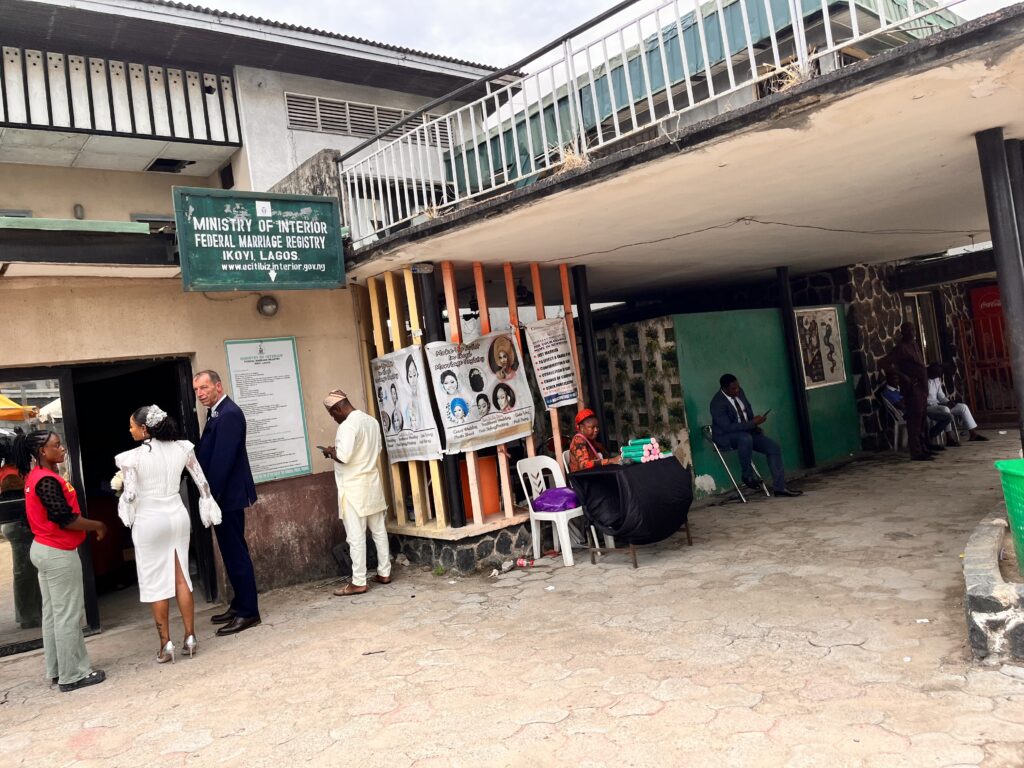
In 2021, the official fee for ordinary marriage was N15,000. It was later increased to N27,000. But the officials still charge more. Ordinary marriage is between two Nigerians while special marriage is between a Nigerian and a foreigner.
During a visit to the registry on March 28, 2024, hundreds of people huddled between canopies and makeshift photography studios as sun rays beamed at the different shades of wedding gowns while couples strolled gorgeously in the expansive compound.
Soon-to-be husbands were drenched with sweat under their blue and black suits. Some threw the customary outfits on their arms as they wrestled their way with their brides into or out of the hollow-like registry rooms. Some strolled into photo studios or waited out another couple as they left the registry’s picture-perfect green signage.
Several persons clad in agbada and buba – mostly old men, women, and kids – sat at different corners of the tiled but dusty compound which could barely take the number of guests present, while soon-to-be brides struggled to fit into their newly sewn dresses at different parts of the registry.
Plates of jollof rice dangled in their hands while used styrofoam and plastic bottles obstructed movement as this reporter walked to the threshold of a crowded room opposite the registry’s main entrance, where a sweaty officer of the Nigeria Security and Civil Defence Corps (NSCDC) manned without efficiency.
It was the administrative office of the registry, an operation room where almost everything happened. Staff in casual dress bundled piles of paperwork around as they spoke in hush tones to different couples wanting one favour or the other.
After manoeuvering through the crowded entrance, I found myself, with the help of the officer’s direction, speaking with Sangosanya Olamide, a female staff at the registry, who went by her middle name, Habibat. After I explained my mission and how I needed help to start the process of a court marriage with my fiancee, Habibat walked me away from the crowd to a two-spaced window on the left side of the dim room.
“Give me your phone number. I will send you details of what you need and the forms you need to fill out,” she said with the air of someone with authority.
Habibat continued speaking, but now asked a series of questions like, “do you have your bachelor’s and birth certificate?” When I responded in the negative, she quickly offered that I fill out the form she would send to me.
Shortly after, I got a message requesting information that included my full name and that of my fiancee, the names of LGAs and fathers’ occupations.
“Kindly send your passport photographs and birth certificate for you and your spouse and both means of identification,” a part of the message reads.
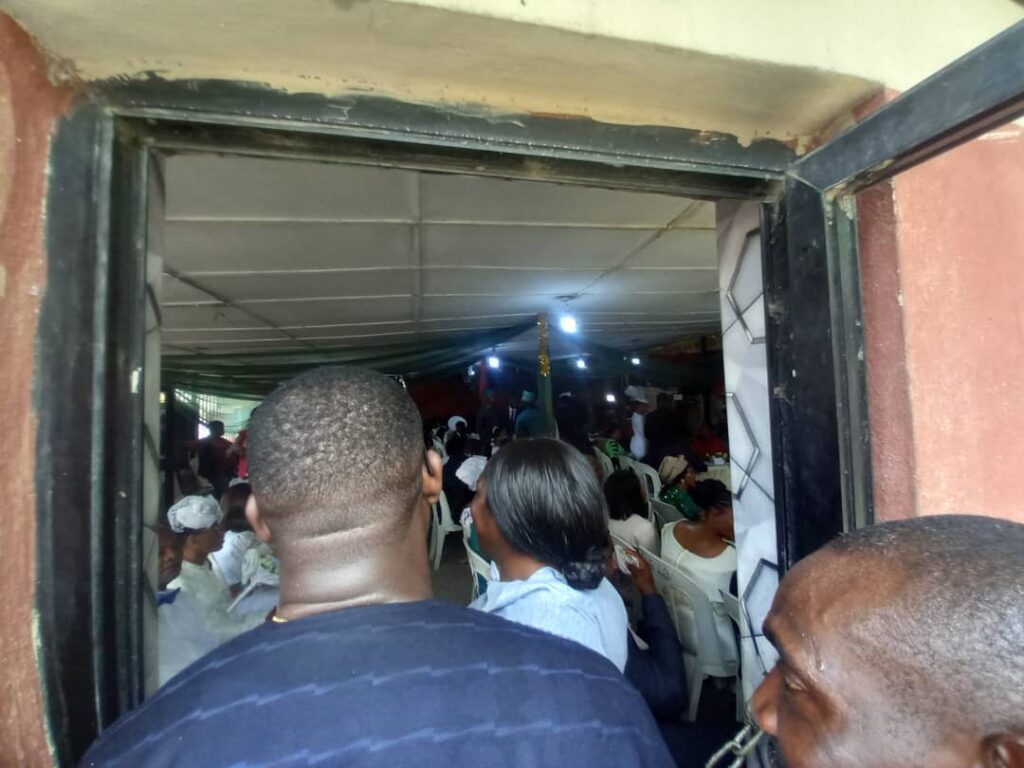
We met at the window after I had filled out the form and sent passport photographs to her WhatsApp. Upon sighting me from where she sat inside the dim room, Habibat motioned me to meet Abiodun, a well-built, tall, dark man.
Abiodun, one of the officials, sat idle on a blue plastic chair with white pieces of paper on his lap while backing printing machines and photocopiers that appeared uncleaned in months. He waved at me and after seconds of formal pleasantries we started a short discussion on getting the registration documents (bachelorhood/spinsterhood and birth certificates) as required.
Altogether, Abiodun said the cost of the four documents was N8,000 – calculating N2,000 for each – and remained unmoved as I tried to haggle.
“I want to call my fiancee to transfer the cash,” I told Abiodun after unsuccessfully trying to beat the price down. As I turned to walk away to make the phone call, I heard Habibat call my name as she ran after me.
“You’re only paying Abiodun for the birth certificates, which cost N2,000 apiece and N4,000 in total,” she exhaled sharply. “The cost of the bachelorhood documents would be deducted from the registration fee.”
I then asked how much was the registration fee for marriage. “N55,000,” Habibat responded. She, in turn, asked about the date I intended to get married.
“August. But I need to sort out everything before then,” I told her and she nodded to show she understood as we walked back to where Abiodun was waiting for us.
“When are you going to pay for the marriage fee,” Habibat asked as she stopped abruptly. “Since my marriage is still in August, I feel we should sort out the certificates thing first, then I will pay for the marriage fee,” I replied.
When I eventually got back to where Abiodun was seated, he gave me two forms to fill; one for my fiancee and the other for me. After filling in the details, I gave the papers back to him and in return, he said: “That’s all. She will reach out to you.” He collected both the documents and the money from me. I thought I was supposed to sign somewhere or be instructed to send copies of our signatures, but Abiodun did not look up after his last statement. He continued sorting through the white papers on his lap.
I called Habibat on the phone as I walked to the registry’s exit and she said, “I will reach out to you when the birth certificates are ready”.
On April 4, Habibat sent the two birth certificates with both documents bearing a stamp of the commissioner of oath, the Lagos judiciary stamp, and that of the state’s high court in Igbosere.
“Hello sir, [send] your means of identification,” Habibat sent a follow-up message, alongside her account details. “Kindly send evidence of payment [for the marriage registration.]”
NIGERIANS ARE TIRED OF EXTORTION AT IKOYI, BUT NO END IN SIGHT
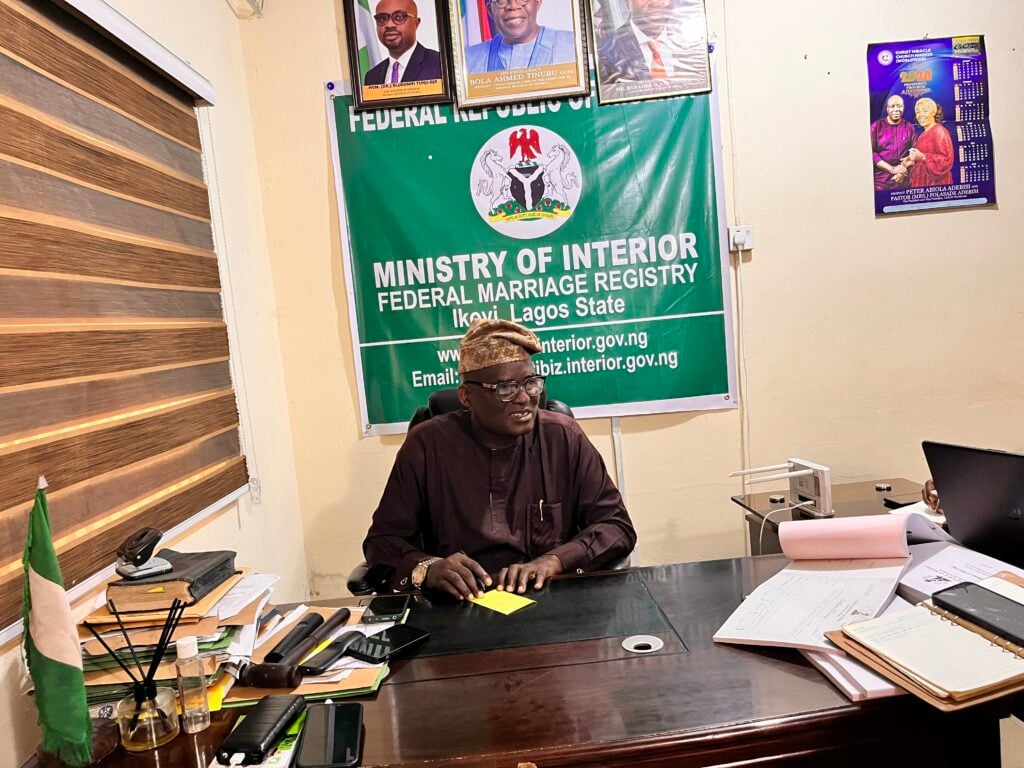
For Odo, the only way the extortion can stop is for full adoption and compliance with the digitalisation of the process.
The lawyer said there has to be notices boldly written and pasted on the walls of halls, offices and premises that giving cash to any official is a crime. He added that phone numbers and emails for lodging of complaints should also be displayed.
“The ministry of interior must take deliberate steps to punish officials who are caught in these acts, but my experience shows that everybody from top to bottom in that registry are partakers,” Odo said.
“The digital process of applying for marriages and payment should be simple. This will make applicants not feel frustrated and then have the need to go to registry officials for help. The registrars are not the problem. Their replacements have continued on the same path which leaves me with no doubt that the higher-ups in the ministry are aware of these things and probably encouraging it.
“No foreigner that visits or weds at Ikoyi Registry will not want to flee from there and the country almost immediately. Unfortunately, once the registry officials see an intending couple and one of them is a foreigner, their gluttony shoots up because they believe they have more money to spare. It is a huge dent in the image of this country.
“It is very possible to clean up our public institutions using technology. For example, the Lagos state judiciary has adopted technology for the filing of cases and it has curbed cases of bribery and corruption to a great extent. Litigants simply file their cases online, upload their documents with evidence of payment and their cases are then assigned to various courts/judges without them having to step foot in the court’s registry. That can be done with the Ikoyi Registry.”
Speaking on the development, Vahyala Kwaga, senior research & policy analyst at BudgIT Foundation, a civic-tech organisation focused on open governance and institutional reforms, said it is unacceptable that government officials redirect public funds into their private accounts.
He said such actions, even going by extant 2009 Civil Service Rules, should attract immediate suspension, at the very least.
“Government officials continue to perpetuate inefficient and illegal means of service delivery primarily because there are no consequences for inefficiency in the civil service. In fact, it is difficult to fire a civil servant. This speaks to a broader problem of a lack of adequate oversight from within ministries, departments and agencies and a lack of oversight from the outside, for example from the head of service of the federation,” Vahyala said.
“One of the reasons corruption thrives in Nigeria is because there is too much (and in some cases) unnecessary human contact. Certain services that can be delivered without contact require citizens to come to a government office, which is a complete waste of time, as citizens would spend hours there for something that could have been handled by email.
“It is hard to believe that the officials within the ministry are completely unaware of these activities. As regards the Ikoyi registry matter, a proper investigation must be carried out to determine the direction in which money flows and if the rumours are true. It speaks to the deeper problem of a lack of consequences for what is agreed to be ‘bad’ behaviour.”
When Kasali Bolaji, the chief marriage registrar in Ikoyi, was contacted to react to the issues of extortion, he invited the reporter to his office. On getting to his office on April 8, he declined to grant the interview after he asked that all the questions be read to him. He said a letter should be written to his supervisor, the permanent secretary and principal registrar of marriages in Nigeria at the ministry of interior in Abuja, the nation’s capital, before he could answer the questions.
Some of the questions read to the registrar bordered on allegations that top officials of the ministry in Abuja gave the registry a financial quota that must be sent monthly, which makes it hard to curb the corrupt activities in the facility. He was also asked why the officials keep circumventing the online portal meant for registration, charging above the approved fee and receiving money in their personal bank accounts.
On April 22, a letter requesting an interview was forwarded to the principal registrar and an acknowledgement copy was received. Despite follow-up calls and messages, the ministry and the registrar refused to comment on the matter.
This story was produced with the support of ZAM Magazine.
Add a comment

